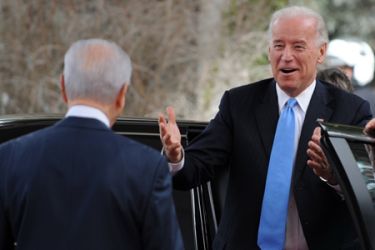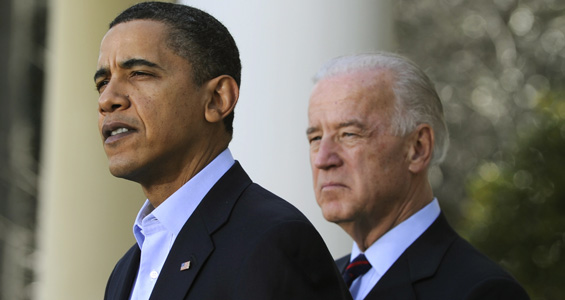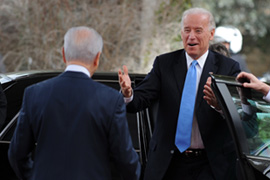Biden: America’s Middle East fixer?
Steve Clemons asks if the US vice president can succeed where others have failed.

 |
| Joe Biden has a reputation as Obama’s fixer and now he has been sent to the Middle East [EPA] |
Joseph Biden, the US vice president, left on Sunday for a head-scratching trip to the Middle East and many are wondering what he is up to.
After all, the vice president has a lot on his plate already.
Biden has been the person behind the White House scenes who has helped nudge forward the tenuous deals between Shia, Sunnis and Kurds which secured Sunday’s historic elections in Iraq.
Almost as hard for Biden was brokering a truce between Ray Odierno, the commanding general of US forces in Iraq, and Christopher Hill, the US ambassador to Iraq, who had more than a few turf scuff-ups.
He has also been working hard on the less sexy parts of President Obama’s national security vision – tying together key international stakeholder agreements to help contain the spread and actually reduce nuclear weapons materials and other WMD relevant assets globally. Obama will host a summit in April built on work that Biden has done.
Biden and his team have also done a great deal of prep work on the Obama economic plan’s jobs and infrastructure components – topics that for the first year were largely ignored by key economic policy architects Timothy Geithner, the treasury secretary, and Lawrence Summers, the national economic advisor.
Biden and his chief economist, Jared Bernstein, have struggled hard on the employment challenge and offered suggestions on small business financing, a variety of hiring incentives for firms, smart grid infrastructure development, high speed rail investments, and have done some very good work advocating a new 21st century, jobs and infrastructure-focused “industrial policy” (two words which seem to be taboo in government now).
Showing face?
| IN depth | |||||||
|
Of all Obama’s senior level cabinet members and advisers, Biden has exceeded expectations and performed better than virtually any other member of the team in generating ideas and pushing the policy needle.
And now he is off to Israel, the West Bank, and Jordan.
Why is he adding this issue to his plate when there is a specific presidential envoy, George Mitchell, tasked with working to get the Palestinians and Israelis back on a credible negotiating track towards a two state solution?
Rahm Emanuel, the White House chief of staff, and Obama tried hard to kick-start an arrangement that would get some sizzle by forcing the Israelis to stop all new settlement construction in the Occupied Territories. That did not work out so well.
Hillary Clinton, the US secretary of state, General Jim Jones, the national security adviser, Robert Gates, the defence secretary, and others have been giving the Israel-Palestine portfolio a lot of time and have made many a trip to the region.
Nothing much has happened as of yet – so it makes one wonder whether dispatching Biden to the region is just doubling down and throwing more of America’s diminishing credibility at a failed approach.
Is Biden just a big personality to “show face” in the region and to try to assure regional leaders that the US still cares?
Alternatively, Biden may be there to really do something, or at least try.
Biden is emerging as the Obama administration’s fixer – the person who can quietly walk into a situation and survey it in a dispassionate, smart way in order to think about a new approach.
As James Traub wrote in a recent New York Times Magazine profile about Biden, quoting this writer in part, Biden straddles two worlds of foreign policy – that of the values-driven idealists, on one hand, who want to do good in the world and who tend to ignore realistic assessments of interests and the costs and benefits in securing those interests; and on the other, the pragmatic, do what it takes approach to foreign policy that focuses on the prioritisation of hard policy choices.
Global fault line
 |
| Joe Biden, right, meets Shimon Peres, the Israeli president [EPA] |
The Israel-Palestine process has broken down. And George Mitchell does not understand that the time he keeps asking for is time the region does not have.
Behind closed doors, Mitchell tells foreign leaders and ministers about his experiences negotiating with the parties in Northern Ireland. What he does not realise is that that terrible conflict could have lasted through a couple more centuries of his patient deal-making and the world would still be getting on.
The Israel-Palestine standoff is a globally consequential fault line that will blow sooner rather than later if the problems and pressures there are not seriously addressed.
Biden gets this. But I have no idea which direction he will go in his discussions during the trip.
Ultimately he knows that resolving the Israel/Palestine situation is a necessary requirement to confronting Iran and robbing Iran of room to run and meddle in the Middle East.
A deal on an Israel/Palestine two track reality is also a vital part of demonstrating to a doubting world that the US can achieve the objectives it sets for itself and is able again to be a sculptor of global affairs.
Obama did not mention much about foreign policy in his State of the Union address this year and did not mention Israel-Palestine at all. We hope that “Biden as fixer” is the mission – rather than using Biden to just put in face time with a region that doubts Obama’s commitment as of late.
Hopefully, Biden can help create opportunities and momentum in a region that poses a defining challenge for the US – even though most of his Obama administration colleagues seem for all of their efforts to be out of ideas and out of steam.
Steve Clemons is the director of the American Strategy Program at the New America Foundation and publishes the popular political blog, The Washington Note.
Al Jazeera is not responsible for the content of external websites.
The views expressed in this article are the author’s own and do not necessarily reflect Al Jazeera’s editorial policy.